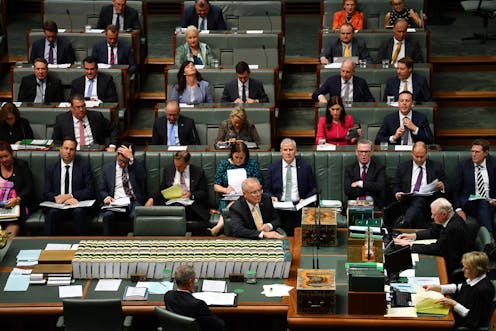how to be a successful political leader
- Written by Gareth Evans, Chancellor, Australian National University

This is an edited extract from a presentation to Leon Mann Leadership Forum, co-sponsored by Academy of Social Sciences in Australia, ANU and University of Melbourne.
Not only in Australia but right around the world’s democracies, the quality of political leadership is as low as I can ever remember it – ranging, with only a handful of exceptions, from the underwhelming to the desolate to the appalling.
Just about everywhere one looks, at least one – and often many more than one – of what I would regard as the essential attributes of responsive and effective political leadership have gone missing.
In many ways, this is not surprising. Politics has always been a bloody and dangerous trade, and it has become significantly more so in an age of instant communication, relentless 24/7 news cycles, social media and dramatically reduced personal privacy. And more exposed than anyone else in politics are those who aspire to leadership positions – as Francis Bacon put it four centuries ago,
He doth like the ape, that the higher he clymbes the more he shows his ars.
To both aspire to and acquire political leadership has always required a degree of self-belief that defies normal human inhibition. But what seems to be required nowadays is an almost pathological ability to stay unmoved by what people think and say about you.
Despite the personal risks involved, there never seems to be a shortage of candidates for these positions. So what are the attributes, self-belief apart, we should reasonably look for in choosing between them? Based on my own direct observations of both Australian and foreign leaders over several decades, I would identify the following ten as mattering most.
Serious intellectual ability should go without saying, even if there are an army of electors in the US and elsewhere currently in denial. But while intellectual firepower may be a necessary condition (Ronald Reagan being the only exception I can readily think of), this is by no means a sufficient condition. History has repeatedly demonstrated the truth of the observation attributed to Walter Lippman nearly a century ago that the supreme qualification for high office is not so much intellect as temperament.
Empathy: the ability to connect, to understand where others are coming from (though not necessarily to sympathise with their positions) and to see how they are seeing you, is probably the important temperamental attribute a leader could have. Not least, this is because a lack of empathy is often (going to the next three attributes on my list) what lies behind poor judgment about people and situations, administrative dysfunctionality and poor communication skills.
Sound judgment is obviously indispensable, although making the right call is often much easier with hindsight than in the heat of the moment. It’s a matter of acting, and being seen to act, in a way which weighs the available evidence, listens to competing arguments, knows who is most worth listening to, is measured rather than impulsive, and learns from experience and the mistakes that inevitably will be made. None of this means avoiding all risks – that way lies total inertia – but it does mean calculating those that are taken.
Basic organisational and time management skills are much more important than is usually recognised, given the number of the balls that every leader has to keep in the air simultaneously, the number of advisers and supplicants pressing for access, and the necessity to constantly prioritise and re-prioritise activity.
Leaders who lack those skills, and don’t compensate by accepting the discipline of those around them who do have them, are ones who (as Kevin Rudd found despite his stellar intellect and other attributes) quickly wear out their welcome with colleagues and other stakeholders.
Communication skills, the ability to connect and persuade – in the parliament, in the media, on the election hustings, in internal party forums, with potential financial supporters – are self-evidently critical. Paul Keating has been the supreme Australian exemplar of those skills in recent times, across multiple forums. Others have been stronger in some forums than others – Bob Hawke was surprisingly unpersuasive in Parliament – but no successful leader I can think of anywhere has lacked them entirely.
A clear sense of strategic direction, combined with the ability to craft and communicate a clear narrative of what the government is trying to achieve overall, has not been a universally evident characteristic of successful leaders. Some have got by just bobbing along with the waves, with their grandest aspiration being to make the country feel “relaxed and comfortable”.
But it has certainly characterised the very best of them, perhaps nowhere more obviously than Hawke and Keating, with their very sophisticated narrative – crafted early in the life of their Labor Governments and sustained over 13 years – built around the themes of very dry, productivity and competitiveness-focused economic policy; very warm, moist and highly compensatory social policy; and strongly liberal internationalist (both globalist and patriotic!) foreign policy.
Unimpeachable personal integrity is hard to argue against. It is not necessary for a good political leader to be a paragon of every domestic virtue, as Bob Hawke amply demonstrated, though the times are clearly becoming more demanding in that respect. But being, and being seen to be, personally honest and incorruptible is a universally accepted baseline.
A work ethic, and associated physical stamina, well above the prevailing norm also matters. Some highly effective leaders have spent less time visibly grinding away at their desks than others – with Paul Keating famously a much later starter and often earlier finisher than Bob Hawke, who maintained almost monastic discipline during his years in office. (And Ronald Reagan, again, not being known to trouble his desk much at all.) But it’s hard to identify a successful leader whose capacity or willingness to be fully briefed and informed across the whole range of their responsibilities has been of Trumpian or Johnsonian proportions.
Resilience is an often under-recognised component of political effectiveness at all levels – the ability to recover ground after the defeats, set-backs and outright humiliations which are, except in fairy-tales, part of every politician’s and political leader’s experience. Those who survive for the long haul are those who bounce back.
The final item on my top-ten list is what I would describe simply as “spark” – the capacity, through sheer force of personality, to ignite enthusiasm, and on occasion real excitement, in one’s colleagues and the wider community. Dunstan, Whitlam, Keating, Hawke, Thatcher, Blair, Clinton, Obama all had – at least at their peak – that infectious quality.
It’s not a sufficient requirement for successful leadership overall – that requires ticking a lot of my other boxes as well – but it’s certainly a mark of distinction, separating run of the mill leaders from those whose reputations grow and last.
There are other candidates for this checklist, one of them arguably – particularly after the last Australian federal election – being “likeability”. But while this does obviously matter for electability, I am not sure that it is crucial when it comes to the long-term assessment of leadership success. While I wouldn’t go all the way with Machiavelli – that it is better for a leader to be feared than loved – there is a lot to be said for respect ultimately mattering more than affection.
Of the ten boxes I have described, not many political leaders would tick every one of them all of the time. And I fear that most of are essentially innate – you either have them or you don’t – rather than capable of being readily learned, in preparation for or on the job.
But if many more of our leaders, both at home and abroad, came closer to consistently displaying all those attributes than is the case at the moment, the world would be a lot safer, saner and happier than it presently is.
Authors: Gareth Evans, Chancellor, Australian National University
Read more http://theconversation.com/gareth-evans-how-to-be-a-successful-political-leader-125233



















